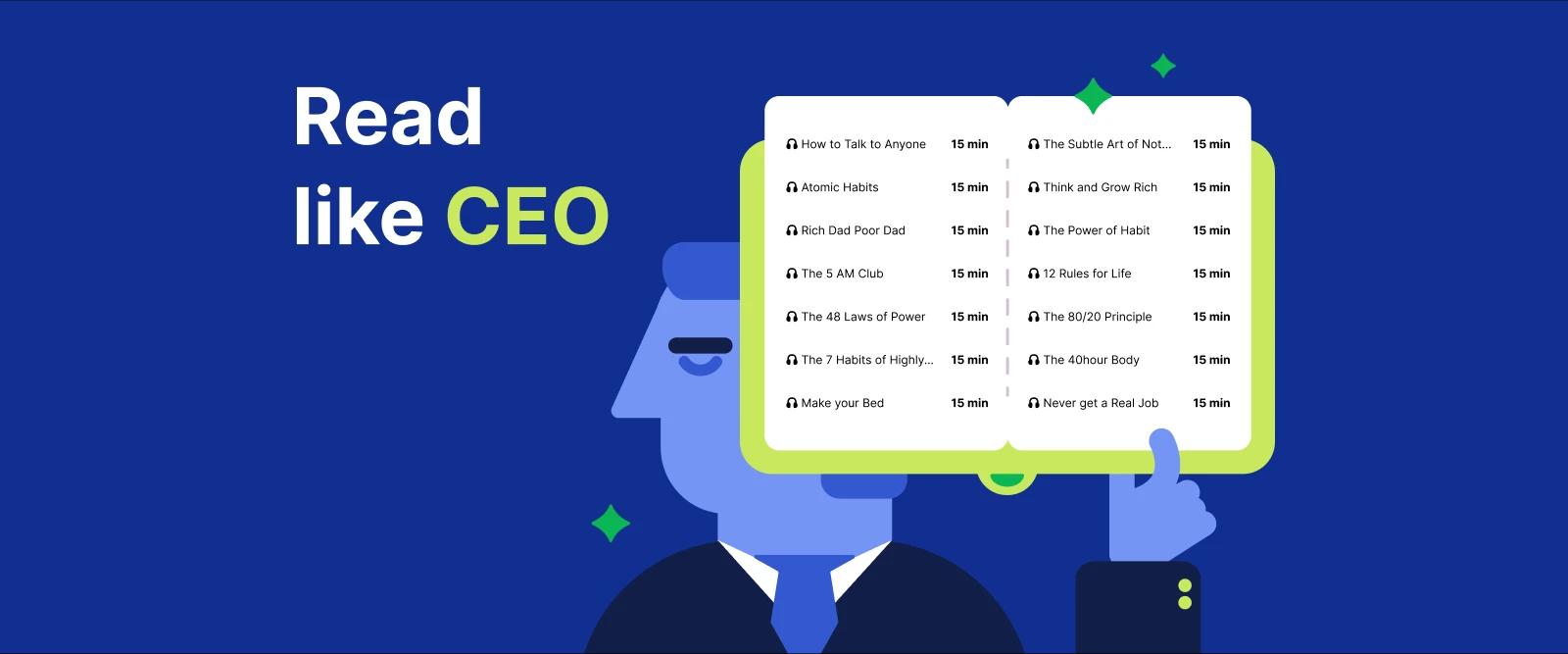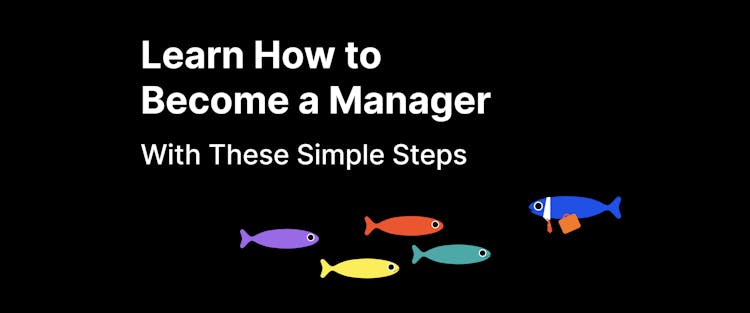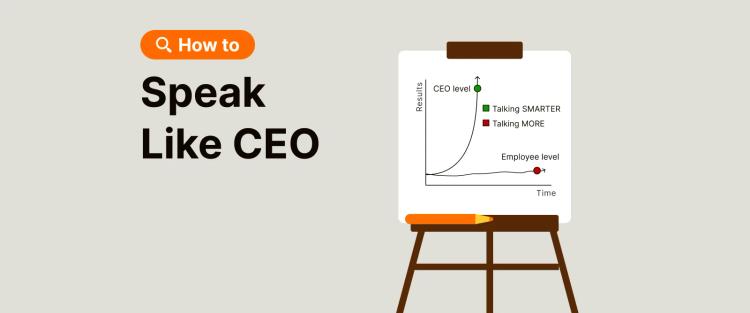Bill Gates reads 50 books a year, roughly one book per week, on top of running a multibillion-dollar company. What if you could also read like a CEO and turn your reading habit into a personal growth tool? Learn how to read books like successful CEOs, such as Elon Musk, Jeff Bezos, and Warren Buffett, using smart self-help strategies from bestselling books.
Whether you're climbing the career ladder or building your own business, the key insights from 'Rich Dad Poor Dad' by Robert Kiyosaki and 'Atomic Habits' by James Clear will help you gain financial wisdom and achieve leadership success. We've gathered the main takeaways from these thought-provoking bestsellers in Headway's library of summaries for easier access. Start your habit-building journey with daily learning nuggets!
Quick tips to read like a CEO:
Skim first, focus later: Scan headings and key sections to find actionable insights, then dive deeper.
Create a routine: Block out time daily for reading, treating it like a scheduled meeting.
Read with purpose: Pick books aligned with your current goals and needs.
Build systems: Schedule reading sessions or "reading vacations" to stay consistent.
Use book summaries: Explore the Headway library to capture key lessons quickly, then go deeper if needed.
What CEO books should you read first? Top 10 recommendations and practical tips
Ever wondered what advocates of great books, like Amazon's founder Jeff Bezos and Apple's CEO Tim Cook, have on their bookshelves? From business books and startup guides to nonfiction books on entrepreneurship and executive coaching, the following bestsellers are on every successful CEO's reading list.
Tailored for your career stage, from a starter CEO thinker to a visionary founder, these book recommendations will help you develop a strong reading habit and teach you to apply your professional skills to real life.
Starter CEO thinker's guide: Business basics for early-career professionals
Build a solid career foundation with books that shape the right habits and mindset. These insights will guide you toward long-term success.
1. 'Atomic Habits' by James Clear
In the early stages of your career, your habits become the invisible foundation for long-term success. 'Atomic Habits' by James Clear shows how small behavior shifts and identity-based habits can create powerful long-term results:
"Every action you take is a vote for the type of person you wish to become."
How to apply it to your career:
Use habit stacking to create a morning focus ritual before work (like "After I make coffee, I'll review my to-do list").
Create an "identity-based goal" like "I'm the kind of person who meets deadlines," and build micro-habits to support it.
Track a single work habit (like checking emails at set times) to reduce distractions and increase output.
2. 'How to Talk to Anyone' by Leil Lowndes
Navigating meetings, networking events, or even checking Slack threads can feel overwhelming when you're new to the workplace. 'How to Talk to Anyone' unpacks 92 subtle techniques for building rapport and commanding attention in any social or professional setting.
How to apply it to your career:
Use the "Sticky Eyes" technique to show people you're listening (especially in interviews or 1-on-1s).
Practice "The Big-Baby Pivot" in group meetings by subtly angling your body toward whoever is speaking to appear engaged.
Start using "You-First" conversation openers, like "How did you get started in this role?" to build rapport naturally.
3. 'Think and Grow Rich' by Napoleon Hill
This updated edition of Hill's classic helps you shift from reactive to proactive thinking. With 'Think and Grow Rich,' you learn that any form of wealth starts with desire, belief, and persistence long before results show up:
"Weak desire brings weak results, just as a small fire makes a small amount of heat."
How to apply it to your career:
Define your "definite chief aim," that one clear, motivating goal that pulls you forward.
Create a daily affirmation based on that goal, and repeat it aloud to reinforce belief.
Join or form a "mastermind group" (even if informal) with friends or colleagues focused on growth and accountability.
Aspiring leader: Books to level up your influence
Enhance your leadership skills with books that help you increase your influence and inspire change. Develop the tools you need to lead effectively.

4. 'The 5 AM Club' by Robin Sharma
What do ultra-productive leaders do before the world wakes up? According to Robin Sharma's 'The 5 AM Club,' they reclaim focused time to work on themselves before the day's demands take over. It gives them an edge when juggling meetings, setting deadlines, and promoting team dynamics.
How to apply it to your career:
Use the 20/20/20 rule (20 minutes of movement, 20 minutes of reflection, 20 minutes of growth) to sharpen mental clarity before your inbox explodes.
Block the early morning as "CEO time" for strategy, journaling, or learning, not reacting.
Build rituals around sleep and wake-up routines to protect your energy and focus throughout the day.
5. 'The 48 Laws of Power' by Robert Greene
When you're moving into leadership or navigating office politics, being skilled isn't enough. You also need strategic awareness. 'The 48 Laws of Power' by Robert Greene reveals how influence, perception, and subtle power dynamics shape success in competitive environments:
"To succeed in the game of power, you have to master your emotions."
How to apply it to your career:
Use Law 1: Never outshine the master when dealing with more senior colleagues — make them feel elevated, not threatened.
Apply Law 3: Conceal your intentions when managing change — share vision selectively to build buy-in first.
Recognize common power tactics in meetings, negotiations, or performance reviews. Then, choose when to mirror, resist, or redirect them.
6. 'The Power of Habit' by Charles Duhigg
At this stage, your performance depends less on raw effort and more on the systems you've built. In 'The Power of Habit,' Charles Duhigg shows how personal and organizational routines drive outcomes and how to change them when growth stalls.
How to apply it to your career:
Identify your "habit loop" at work (cue → routine → reward) and rewrite unproductive ones (such as constant multitasking).
Apply the same loop framework to shift team behavior, like improving meeting culture or feedback rhythms.
Use CEO learning habits (like weekly reflection or workout routines) to trigger positive changes across your work and life.
7. 'Rich Dad Poor Dad' by Robert Kiyosaki
Through storytelling and practical contrast, Kiyosaki reveals how to shift from earning a paycheck to building lasting wealth. 'Rich Dad Poor Dad' challenges traditional beliefs about income and security, encouraging you to think like investors, not just earners:
"It's not about how much money you make. It's about how much money you keep."
How to apply it to your career:
Shift your mindset from "salary = success" to building assets: investments, side ventures, or intellectual property.
Learn to read basic financial statements and understand cash flow for personal wealth and managerial responsibility.
Teach your team the basics of value creation to manage budgets effectively.https://makeheadway.com/library/books/rich-dad-poor-dad-what-the-rich-teach-their-kids-about-money-summary/
Visionary founder: Guides to think bigger and bolder
Expand your thinking with books that encourage bold ideas and innovative leadership. Learn how to scale your business and lead with vision.
8. 'Millionaire Success Habits' by Dean Graziosi
Success at the executive level isn't just about innovation; it's about consistent mindset mastery. 'Millionaire Success Habits' breaks down the mental and behavioral patterns behind self-made success and offers tools to rewire old habits that sabotage growth.
How to apply it to your career:
Use Graziosi's "why seven times" technique to reconnect with your core mission — especially useful during burnout or high-pressure pivots.
Practice the "success loop" to shift from reaction to momentum: choose to empower beliefs → take action → get results → reinforce belief.
Replace default habits (overworking, control-freak tendencies) with systems prioritizing clarity, delegation, and balance.
9. 'The 80/20 Principle' by Richard Koch
What if 80% of your results came from just 20% of your effort? In 'The 80/20 Principle,' Koch explores how to drive success in business, productivity, and personal life with minimum input:
"The 80/20 Principle asserts that a minority of causes, inputs, or effort usually lead to a majority of the results, outputs, or rewards."
How to apply it to your career:
Run a weekly audit: What 20% of clients, tasks, or features drive 80% of growth? Then double down on them.
Apply the principle to your calendar by cutting low-impact meetings or reports and protecting deep work blocks.
Teach your leadership team to focus on the "vital few" rather than the "trivial many" to lead with vision.
10. 'Make Your Bed' by Admiral William H. McRaven
In high-stakes environments, simplicity is your strength. 'Make Your Bed' delivers 10 principles from Navy SEAL training that reinforce the power of small wins, personal discipline, and leading by example:
"If you want to change the world, start off by making your bed."
How to apply it to your career:
Begin your day with a symbolic success, like making your bed or journaling, to build psychological readiness.
Embrace the idea of "embracing the suck" by leaning into discomfort during product pivots or culture reshaping.
Share stories from this book with your team to strengthen morale and reinforce shared values (such as persistence, teamwork, and accountability).https://makeheadway.com/library/books/the-80-20-principle-summary/
Top three CEO reading habits to adopt: How the best leaders learn smarter
CEOs don't read for entertainment only. They read to evolve strategically, systematically, and with crystal-clear purpose. Let's break down the three core habits that set CEO-level readers apart and help you adopt a success mindset.
1. Reading speed: Skim the text and slow down with purpose
Most high-performing CEOs don't read every word. Instead, they scan for structure and then zoom in on what matters. Sheryl Sandberg, the ex-COO of Meta and the author of 'Lean In,' reads fast but with filters. She sets a clear goal (like improving workplace communication) as a framework to skip irrelevant content and focus only on applicable strategies.
 How to develop this habit:
How to develop this habit:
Follow a preview technique: Read the table of contents, headings, intro, and conclusion first.
Ask: "Is this actionable for me right now?" If not, move on.
Use summaries: Headway's summaries can help you scan for value before committing to the whole book.
2. Reading system: When, where, and how you should read
Reading or listening to an audiobook isn't a random act for CEOs. It's a ritual built into their daily or weekly system. They protect that time like a meeting with a board member. For example, Microsoft co-founder Bill Gates takes weeklong "reading vacations" to enjoy his favorite books and recover. He uses this time to reflect deeply and write long-form memos that shape future company strategy.
How to develop this habit:
Schedule your reading like an appointment: For example, set a time for "10 minutes after breakfast."
Designate a reading space: This can happen while you commute to work, at your coffee shop corner, or in your evening wind-down chair.
Use reading triggers: Practice reading triggers like, "After brushing my teeth, I'll read one summary."
3. Intentionality: Read with a clear outcome in mind
CEO readers don't pick any new books randomly. Every book they choose is tied to a problem they want to solve, a skill they want to build, or a perspective they want to gain. For example, Jeff Bezos made 'The Effective Executive' by Peter Drucker a must-read for senior Amazon employees because it matched their need for disciplined decision-making.
How to develop this habit:
Before reading anything, ask: "What am I trying to improve right now?"
Use summaries to explore multiple books quickly, then decide what to go deeper on.
Keep a "Need to Learn" list and match summaries to it weekly.
What it means to read like a CEO
To read like a CEO and to speak like a CEO means to absorb big ideas efficiently and put them to use immediately. For example, the American investor and the former CEO of Berkshire Hathaway, Warren Buffett, reportedly spends 80% of his day reading.
His daily reading routine isn't limited to LinkedIn posts or social media content. It also includes financial reports and wealth-building books, such as 'Keeping At It' by Paul Volcker and 'The Intelligent Investor' by Benjamin Graham. Here's what having a CEO mindset looks like:
Seven CEO mindset traits explained
A CEO mindset is a success-oriented, strategic thinking designed to focus on long-term goals for maximum results. The most successful CEOs:
Think in decades, not days
A good entrepreneur focuses on long-term impact over short-term wins since every decision builds toward a vision.Seek clarity through information
A goal-focused business leader reads not to be entertained but to gain insight, solve problems, and lead with confidence.Prioritize learning as a strategy
Treating learning like a daily discipline, not a bonus, when there's free time is key.Make decisions with limited data
Absorbing diverse perspectives fast and filtering what matters most can help with decision-making.Build habits that pay off
Protecting your time, energy, and focus through repeatable systems like daily reading helps you grow.Invest in mindset before tools
Self-growth starts internally, with better thinking, better questions, and sharper awareness.Curate information intentionally
Choosing a good book or podcast based on its relevance, not popularity, is a sure path toward thoughtful and value-driven knowledge.

Build your CEO reading routine with Headway book summaries
If you want to read like a CEO, you need something more than a large book collection. The right learning tools and consistency can help you develop a reading routine worthy of a successful leader and ambitious learner.
With Headway's summaries, you can gain essential insights from top nonfiction books like 'Atomic Habits' by James Clear and 'The 80/20 Principle' by Richard Koch to boost your career growth and leadership skills. The bite-sized format will seamlessly fit into your busy schedule so you can continue learning and leading like a true professional.
Ready to move toward your personal growth? Download the Headway app today and gain access to hundreds of summaries designed to help you thrive, both personally and professionally.
Frequently Asked Questions
How many books do CEOs read per year?
CEOs typically read 50+ books a year, with some, like Bill Gates, reading up to two per week. This consistent reading habit helps them stay informed, gain new perspectives, and make data-driven decisions.
What are the best CEO mindset books?
The best CEO mindset books help leaders build the right habits, sharpen their strategic thinking, and foster the personal growth needed to succeed in high-level leadership. Some of the best books for CEOs include:
'Good to Great' by Jim Collins
'The 5 AM Club' by Robin Sharma
'The 48 Laws of Power' by Robert Greene
'Atomic Habits' by James Clear
These bestsellers offer practical strategies on leadership, mindset, decision-making, and wealth-building.
What if I don't have time to read full books?
You can still gain valuable insights by exploring summaries, listening to audiobooks, or reading bite-sized chapters on key topics. Set aside 10–15 minutes daily for these quick learning moments to keep growing.
Can book summaries really replace reading?
Yes, summaries provide a concise overview of the key ideas and can replace full books when you're short on time. They're great for exploring multiple books, but full books are better for deep dives into complex ideas.
What's the fastest way to read like a CEO?
Skim for key insights, prioritize actionable content, and use summaries to get the essence of books. Try speed reading techniques and build a consistent daily reading habit, even if it's just 10 minutes a day.
What are the best books for CEOs?
For CEOs, the books they read must offer both practical strategies and transformational thinking. The following books are highly regarded in the business world for their ability to shape effective leadership, build strong organizational cultures, and create lasting success:
'Rich Dad Poor Dad' by Robert Kiyosaki
'Five Dysfunctions of a Team' by Patric Lencioni
'The Power of Habit' by Charles Duhigg













